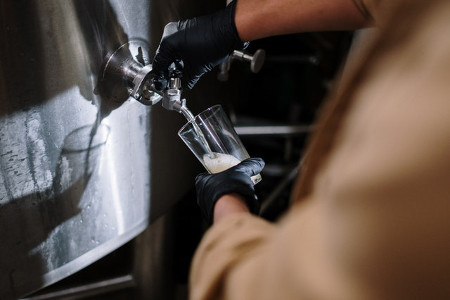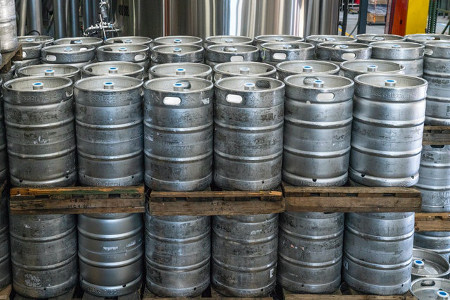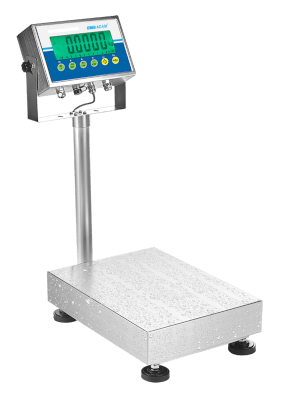
Consumers are becoming choosier when it comes to beer. Hobbyists and microbreweries are rising, as are craft beer sales. The market is becoming saturated, and even big brands buy off smaller craft breweries to get in the game. Because of these factors, it’s important to create a quality recipe and scale production efficiently to get in the market. Scales are used throughout various stages of beer brewing, and they’re a key component of successful production. In this post, we’ll explain how scales are used to make beer and which ones you should pick for your operation.
Why use scales when brewing beer?
There are many reasons to use scales, whether for a microbrewery or an international brand. Consistency is first and foremost. If you created a beer with a special taste, you want to make sure you can recreate that taste in every bottle. If ingredients are not measured properly, the taste can be unpleasant, and the alcohol content (typically referred to as alcohol by volume or ABV) can change.
Specific quantities can allow even new employees who are not familiar with a recipe to recreate the product with ease. A formula can also be tweaked more easily. Weight quantities also make recording easier. Recipes should always be written down with the exact amounts used during brewing. That helps ensure good batches get reproduced, and it can also allow brewers to find out why a recipe did not work.
Measuring ingredients can also help minimize waste by ensuring the right amount of ingredients are used in correct proportions. For home and microbreweries, it can be particularly tricky to scale the right amount of yeast for a first batch, so precision is very important. Even small batches can be ruined by imprecise recipes, which spills all the ingredients, time, money and effort down the drain.

Scales can also help during the carbonation process, depending on your method of choice. Carbonation can be added to beer in two ways: natural carbonation or forced carbonation. Natural carbonation results during the fermentation process of beer; when yeast digests sugar, alcohol and CO2 are the byproducts. This means brewers must carefully measure the sugar and yeast in order to create the proper amount of carbonation.
Forced carbonation is putting beer (post fermentation) in a container and pumping it with CO2 directly. Nowadays, this is the preferred method, particularly for large quantities.
It takes less time to carbonate a batch and forced carbonation allows beer to sit longer, but naturally carbonated beer is smoother and is considered more flavorful. In the end, it comes down to personal preference and equipment availability.
Scales are also used during bottling and to fill cans or kegs. Before fermentation, wort (unfermented beer) is made by boiling the ingredients together. Because some of the water can boil away, it’s important to add more water as need during the fermentation process. Monitoring a keg’s weight can help brewers ensure there is always enough water, and that the beer is not losing carbonation.
The weight of bottles (and their thickness) can also help ensure that carbonation, when combined with temperature and agitation, does not create too much pressure, which could break the glass bottles.
Moisture analysis for brewing beer
Moisture analyzers are used by large breweries for quality checks of ingredients such as hops, malt and barley, especially to prevent fungal contamination and quality decline during storage. Grain is also checked after the brewing process to reduce waste.
Moisture analysis can be also be useful when buying grains in bulk, since moisture levels can affect the grain’s weight, which could make it more expensive. Checking the grain before buying it ensures the brewery is not paying more money for water weight.

Why measure by weight and not by volume?
Using volume might seem more intuitive since beer is liquid. However, measuring by volume is not as accurate as measuring by mass. The shape of ingredients can dictate how much fits in a cup, while density and temperature can affect a liquid’s volume. Beer goes through numerous processes that can affect volume, including boiling, fermentation, and carbonation. Mass does not have to take these factors into account. That additional precision can improve the beer’s taste and help brewers tweak their recipe to perfection.
Even small balances can also measure a wider range. Take your usual measuring cups and spoons, where you often need multiple items to measure various ingredients. With a scale, you can simply put the ingredients in a container (tared, of course) and fill it until you have the right weight.
What kind of scale do you need for brewing?
First and foremost, you must establish your level of production, and the weight range you will need. If a brewery focuses on seasonal flavors or taste experiments, they will weigh smaller quantities than a brewery focusing on a single product.
Depending on the size of your operation, you’re most likely going to need more than one scale. Usually, micro or home breweries use a compact or precision balance to measure ingredients such as hops, spices, yeast and other fine items, and a bench or floor scale for batches, kegs, mass production and bottling. Some breweries also have scales to check grain deliveries and yeast brinks. Larger breweries often have platform scales for larger batches and shipping and can buy more expensive balances that include more features that can save them time.
For large amounts of shipping and receiving, pallet truck scales or pallet weighing beams offer maneuverability and heavy-duty weighing capacities.

What about trade approval?
While home brewing does not require trade approval (unless you sell the beer), any brewery that bottles and sells their beer, as well as suppliers of ingredients, beer distributors and batch quality controllers, are required to use trade-approved scales by law. A brewer that does not use a properly trade-approved scale to sell beer could be fined and their business could suffer, so be sure to check local laws and use scales that are legal-for-trade.
Some features to keep in mind
The tare key is very important, especially for fine spices. You don’t want individual ingredients to overpower the taste of everything else because the weight of the recipient was included. Taring bottles or kegs also ensures they’re filled correctly. Grains are often delivered or stored in bags, so it’s important to check that as well. Some scales allow users to set preset tare weights, which is very convenient for breweries that frequently use the same containers. If you do end up using a scale with a preset tare option, it’s recommended to standardize keg sizes to streamline operations.
Don’t forget, tared weight still counts towards filling a scale’s capacity. When weighing something heavy, like a keg, you need to make sure the scale can withstand both the container’s weight and the material filling it.
Checkweighing with audible alarms or bright LEDs can make bottling, kegging and shipping tasks quicker and easier. Checkcounting can be used for packs containing multiple cans or bottles.
Percentage weighing is very helpful for scaling recipes; it avoids manual calculations and can be used to ratio the ingredients.
Some precision balances offer a formulation feature that allows multiple recipes with various ingredients to be stored for breweries with a lot of different recipes.

Washdown scales with an IP rating above 66 can be useful, since they’re very easy to wash and can withstand frequent spills. At the very least, consider using a stainless steel pan. Strict hygienic protocols are necessary to maintain a brewery, especially because of ingredients used like sugar and yeast.
While specific gravity and density are important to determine how much sugar is converted to alcohol, most brewers use a hydrometer or other devices designed for that type of test rather than a precision balance. However, a precision balance is still used to calibrate hydrometers, and you should calibrate yours frequently in order to verify that the fermentation process is proceeding correctly. The formula for specific gravity is SG = Mass (g) / Volume (ml). If you don’t have a hydrometer on hand, you can also use a density kit with a precision balance.
Do you have more questions? Would you like some help finding the right scale for your brewery? Contact us, we’ll be happy to guide you.

